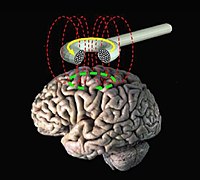
rTMS treatment of visual hallucinations using a connectivity-based targeting method - A case study
Sign Up to like & getrecommendations! Published in 2019 at "Brain Stimulation"
DOI: 10.1016/j.brs.2019.09.003
Abstract: Visual hallucinations (VH) are conscious visual perceptions that occur in the absence of an external stimulus. VHs are neuro-ophthalmological dysfunctions that are very disabling and are based on various pathologies, including eye diseases and neurodegenerative… read more here.
Keywords: fmri; visual hallucinations; stimulation; connectivity ... See more keywords

Clinical and demographic predictors of response to rTMS treatment in unipolar and bipolar depressive disorders
Sign Up to like & getrecommendations! Published in 2017 at "Clinical Neurophysiology"
DOI: 10.1016/j.clinph.2017.07.395
Abstract: OBJECTIVE Previous studies investigated predictors of repetitive transcranial magnetic stimulation (rTMS) response in depressive disorders but there is still limited knowledge about clinical predictors. Moreover, predictors of rTMS response in bipolar depression (BDD) are less… read more here.
Keywords: response; depressive disorders; rtms; clinical demographic ... See more keywords

Association of the loudness dependence of auditory evoked potentials with clinical changes to repetitive transcranial magnetic stimulation in patients with depression.
Sign Up to like & getrecommendations! Published in 2018 at "Journal of affective disorders"
DOI: 10.1016/j.jad.2018.05.023
Abstract: BACKGROUND Although the application of repetitive transcranial magnetic stimulation (rTMS) for treatment of depression has been well investigated, there are few biological predictors of clinical outcomes to rTMS treatment. Previous studies have suggested that the… read more here.
Keywords: depression; treatment; repetitive transcranial; transcranial magnetic ... See more keywords

Differentiating responders and non-responders to rTMS treatment for depression after one week using resting EEG connectivity measures.
Sign Up to like & getrecommendations! Published in 2019 at "Journal of affective disorders"
DOI: 10.1016/j.jad.2018.08.058
Abstract: BACKGROUND Non-response to repetitive transcranial magnetic stimulation (rTMS) treatment for depression is costly for both patients and clinics. Simple and cheap methods to predict response would reduce this burden. Resting EEG measures differentiate responders from… read more here.
Keywords: depression; connectivity; non responders; responders non ... See more keywords

Cognitive profiles in major depressive disorder: Comparing remitters and non-remitters to rTMS treatment
Sign Up to like & getrecommendations! Published in 2019 at "Psychiatry Research"
DOI: 10.1016/j.psychres.2019.07.007
Abstract: Major Depressive Disorder (MDD) is typically accompanied by cognitive impairment. Repetitive Transcranial Magnetic Stimulation (rTMS) treatment for MDD involves stimulation of the dorsolateral prefrontal cortex which plays an important role in cognition. This study aimed… read more here.
Keywords: non remitters; depressive disorder; treatment; major depressive ... See more keywords

Suicidal behavior in treatment resistant major depressive disorder patients treated with transmagnetic stimulation(TMS) and its relationship with cognitive functions
Sign Up to like & getrecommendations! Published in 2020 at "Psychiatry Research"
DOI: 10.1016/j.psychres.2020.112873
Abstract: The aim of this study is to investigate the effects of rTMS treatment on suicidal thoughts/behaviors and to determine the cognitive mechanisms underlying the effects of rTMS treatment on suicidal thoughts/behaviors in treatment-resistant depression(TRD). Thirty… read more here.
Keywords: treatment resistant; treatment; cognitive functions; suicidal thoughts ... See more keywords

Peripheral endocannabinoid serum level in association with repetitive transcranial magnetic stimulation (rTMS) treatment in patients with major depressive disorder
Sign Up to like & getrecommendations! Published in 2021 at "Scientific Reports"
DOI: 10.1038/s41598-021-87840-5
Abstract: Repetitive transcranial magnetic stimulation (rTMS) is an effective and well tolerable biological intervention in major depressive disorder (MDD) contributing to rapid symptom improvement. Molecular mechanisms underpinning the therapeutic effects of rTMS have still not been… read more here.
Keywords: stimulation; treatment; repetitive transcranial; transcranial magnetic ... See more keywords

Single Channel EEG Classification: A Case Study on Prediction of Major Depressive Disorder Treatment Outcome
Sign Up to like & getrecommendations! Published in 2021 at "IEEE Access"
DOI: 10.1109/access.2020.3046993
Abstract: In multichannel EEG, several electrodes are attached to the head that may be annoying for patients and troublesome for operators. Moreover, the number of electrodes is the main reason of the infeasibility of developing EEG… read more here.
Keywords: channel eeg; treatment; treatment outcome; rtms treatment ... See more keywords

Sequential Prefrontal and Temporoparietal Repetitive Transcranial Magnetic Stimulation (rTMS) for Treatment of Tinnitus With and Without Comorbid Depression: A Case Series and Systematic Review
Sign Up to like & getrecommendations! Published in 2022 at "Frontiers in Neurology"
DOI: 10.3389/fneur.2022.831832
Abstract: Background Tinnitus distress is related to both the loudness and intrusiveness of the tinnitus percept. Treatment approaches targeting both attentional/limbic and auditory systems may better alleviate tinnitus distress than approaches targeting the auditory system alone.… read more here.
Keywords: review; rtms treatment; tinnitus; stimulation ... See more keywords

Three Weeks of rTMS Treatment Maintains Clinical Improvement But Not Electrophysiological Changes in Patients With Depression: A 6-Week Follow-Up Pilot Study
Sign Up to like & getrecommendations! Published in 2019 at "Frontiers in Psychiatry"
DOI: 10.3389/fpsyt.2019.00351
Abstract: Our previous study demonstrated that 3 weeks of repetitive transcranial magnetic stimulation (rTMS) increases P200 amplitudes and improves the symptoms of depression and anxiety in depression patients. In the present study, we investigated whether 3… read more here.
Keywords: depression; week follow; week; treatment ... See more keywords

The Static and dynamic functional connectivity characteristics of the left temporoparietal junction region in schizophrenia patients with auditory verbal hallucinations during low-frequency rTMS treatment
Sign Up to like & getrecommendations! Published in 2023 at "Frontiers in Psychiatry"
DOI: 10.3389/fpsyt.2023.1071769
Abstract: Background Auditory verbal hallucinations (AVH) are a core symptom of schizophrenia. Low-frequency (e.g., 1 Hz) repetitive transcranial magnetic stimulation (rTMS) targeting language processing regions (e.g., left TPJ) has been evident as a potential treatment for… read more here.
Keywords: rtms; left tpj; rtms treatment; group ... See more keywords